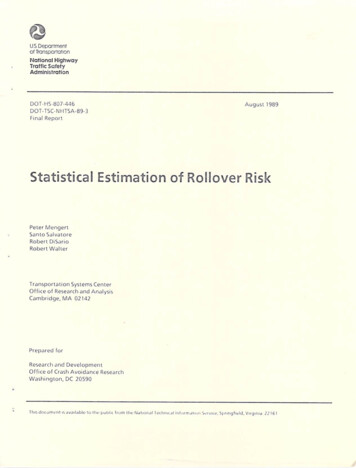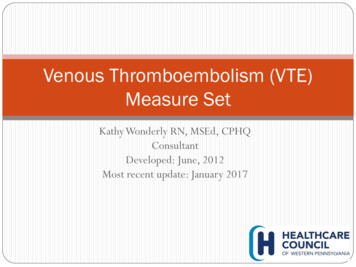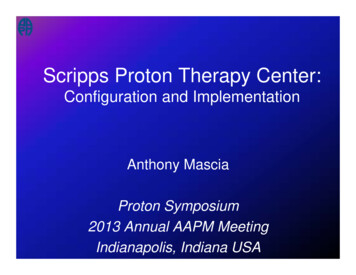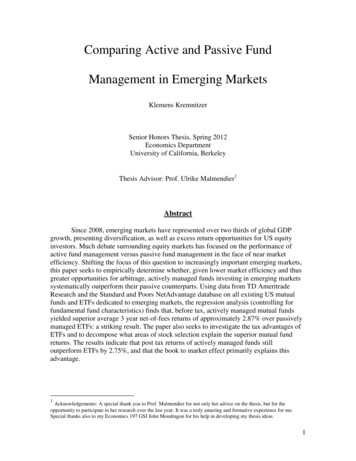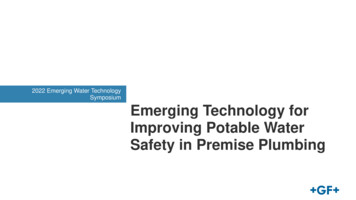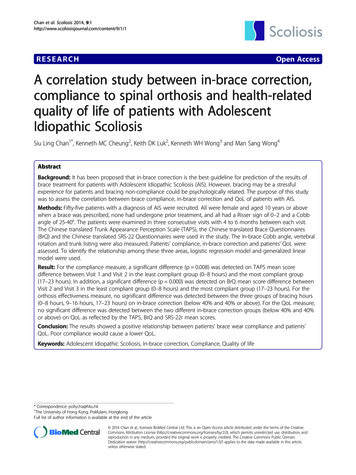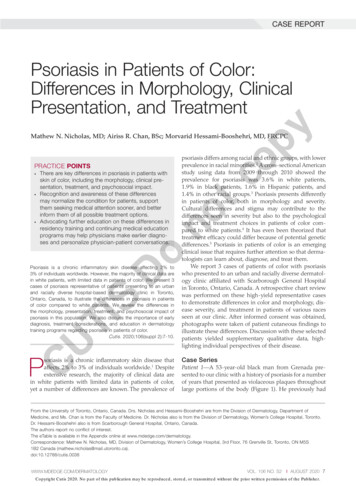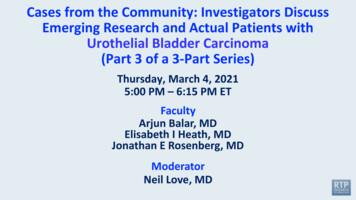
Transcription
Cases from the Community: Investigators DiscussEmerging Research and Actual Patients withUrothelial Bladder Carcinoma(Part 3 of a 3-Part Series)Thursday, March 4, 20215:00 PM – 6:15 PM ETFacultyArjun Balar, MDElisabeth I Heath, MDJonathan E Rosenberg, MDModeratorNeil Love, MD
FacultyArjun Balar, MDAssociate Professor, Department of MedicineDirector, Genitourinary Medical Oncology ProgramNYU Perlmutter Cancer CenterNew York, New YorkElisabeth I Heath, MDAssociate Center Director, Translational SciencesChair, Genitourinary Oncology Multidisciplinary TeamProfessor of Oncology and MedicineHartmann Endowed Chair for Prostate Cancer ResearchDirector, Prostate Cancer ResearchKarmanos Cancer InstituteWayne State University School of MedicineDetroit, MichiganJonathan E Rosenberg, MDChief, Genitourinary Medical Oncology ServiceDivision of Solid Tumor OncologyEnno W Ercklentz ChairMemorial Sloan Kettering Cancer CenterNew York, New York
Commercial SupportThis activity is supported by educational grants from Astellas andSeagen Inc and Merck.
Dr Love — DisclosuresDr Love is president and CEO of Research To Practice. Research To Practice receives funds in the form ofeducational grants to develop CME activities from the following commercial interests: AbbVie Inc,Acerta Pharma — A member of the AstraZeneca Group, Adaptive Biotechnologies Corporation, Agendia Inc,Agios Pharmaceuticals Inc, Amgen Inc, Array BioPharma Inc, a subsidiary of Pfizer Inc, Astellas, AstraZenecaPharmaceuticals LP, Aveo Pharmaceuticals, Bayer HealthCare Pharmaceuticals, BeiGene Ltd, Biodesix Inc,bioTheranostics Inc, Blueprint Medicines, Boehringer Ingelheim Pharmaceuticals Inc, Bristol-Myers SquibbCompany, Celgene Corporation, Clovis Oncology, Daiichi Sankyo Inc, Dendreon Pharmaceuticals Inc, Eisai Inc,EMD Serono Inc, Epizyme Inc, Exact Sciences Inc, Exelixis Inc, Five Prime Therapeutics Inc, Foundation Medicine,Genentech, a member of the Roche Group, Genmab, Gilead Sciences Inc, GlaxoSmithKline, Grail Inc, GuardantHealth, Halozyme Inc, Helsinn Healthcare SA, ImmunoGen Inc, Incyte Corporation, Infinity Pharmaceuticals Inc,Ipsen Biopharmaceuticals Inc, Janssen Biotech Inc, administered by Janssen Scientific Affairs LLC, JazzPharmaceuticals Inc, Karyopharm Therapeutics, Kite, A Gilead Company, Lexicon Pharmaceuticals Inc,Lilly, Loxo Oncology Inc, a wholly owned subsidiary of Eli Lilly & Company, Merck, Merrimack PharmaceuticalsInc, Myriad Genetic Laboratories Inc, Natera Inc, Novartis, Novocure Inc, Oncopeptides, Pfizer Inc, PharmacyclicsLLC, an AbbVie Company, Prometheus Laboratories Inc, Puma Biotechnology Inc, Regeneron Pharmaceuticals Inc,Sandoz Inc, a Novartis Division, Sanofi Genzyme, Seagen Inc, Sirtex Medical Ltd, Spectrum Pharmaceuticals Inc,Sumitomo Dainippon Pharma Oncology Inc, Taiho Oncology Inc, Takeda Oncology, Tesaro, A GSK Company,Teva Oncology, Tokai Pharmaceuticals Inc and Verastem Inc.
Research To Practice CME Planning Committee Members,Staff and ReviewersPlanners, scientific staff and independent reviewers for Research To Practicehave no relevant conflicts of interest to disclose.
Dr Balar — DisclosuresConsulting AgreementsAstraZeneca Pharmaceuticals LP, Genentech, a member of theRoche Group, Janssen Biotech Inc, Merck, Nektar, Pfizer Inc,Seagen IncContracted ResearchAstraZeneca Pharmaceuticals LP, Genentech, a member of theRoche Group, Immunomedics Inc, Janssen Biotech Inc, Merck,Nektar, Pfizer Inc, Seagen Inc
Dr Heath — DisclosuresAdvisory CommitteeAstraZeneca Pharmaceuticals LP, Bristol-Myers Squibb Company, SanofiGenzymeConsulting AgreementAstellasContracted ResearchAstellas, AstraZeneca Pharmaceuticals LP, Boehringer IngelheimPharmaceuticals Inc, Bristol-Myers Squibb Company, Caris Life Sciences,Celgene Corporation, Celldex Therapeutics, Corcept Therapeutics, CureMetaLLC, Dendreon Pharmaceuticals Inc, eFFECTOR Therapeutics Inc, EsanikTherapeutics, Fortis Therapeutics, Genentech, a member of the RocheGroup, GlaxoSmithKline, Ignyta Inc, Inovio Pharmaceuticals Inc, MedivationInc, a Pfizer Company, Merck, Merck Sharp & Dohme Corp, OncolysBioPharma, Plexxikon Inc, Seagen Inc, Synta Pharmaceuticals Corp, TakedaOncology, Tokai Pharmaceuticals Inc, Zenith EpigeneticsPaid TravelAstellas, Caris Life Sciences, Seagen IncSpeakers BureauSanofi Genzyme
Dr Rosenberg — DisclosuresAdvisory CommitteeAstellas, Seagen IncConsulting AgreementsAstellas, AstraZeneca Pharmaceuticals LP, Bayer HealthCarePharmaceuticals, Boehringer Ingelheim Pharmaceuticals Inc, BristolMyers Squibb Company, EMD Serono Inc, Genentech, a member ofthe Roche Group, GlaxoSmithKline, Janssen Biotech Inc, Merck,Mirati Therapeutics, Pfizer Inc, Seagen IncContracted ResearchAstellas, AstraZeneca Pharmaceuticals LP, Bayer HealthCarePharmaceuticals, Genentech, a member of the Roche Group, QEDTherapeutics, Seagen Inc
We Encourage Clinicians in Practice to Submit QuestionsFeel free to submit questions now before the programbegins and throughout the program.
Familiarizing Yourself with the Zoom InterfaceHow to answer poll questionsWhen a poll question pops up, click your answer choice from the available options.Results will be shown after everyone has answered.
Cancer Conference Update: What Happened atthe 2020 San Antonio Breast Cancer Symposium Management of HER2-Positive Breast CancerMonday, March 8, 20215:00 PM – 6:00 PM ETFacultyMark D Pegram, MDModeratorNeil Love, MD
Data Perspectives: Investigators Discuss theEffects of Emerging Research on the Care ofPatients with Acute Myeloid LeukemiaWednesday, March 10, 20217:00 PM – 8:00 PM ETFacultyAlexander Perl, MDEunice S Wang, MDModeratorNeil Love, MD
Meet The ProfessorManagement of Chronic Lymphocytic LeukemiaThursday, March 11, 20215:00 PM – 6:00 PM ETFacultySteven Coutre, MDModeratorNeil Love, MD
Dissecting the Decision: Clinical and Nursing InvestigatorsProvide Practical Perspectives on Key Issues in Cancer CarePart 1 — Acute Myeloid LeukemiaTuesday, March 16, 20215:00 PM – 6:00 PM ETFacultyRhonda Hewitt, MSN, ANP, AOCNPMark Levis, MD, PhDModeratorNeil Love, MD
Meet The ProfessorOptimizing the Selection and Sequencingof Therapy for Patients with AdvancedGastrointestinal CancersWednesday, March 17, 20215:00 PM – 6:00 PM ETFacultyAlan P Venook, MDModeratorNeil Love, MD
Dissecting the Decision: Clinical and Nursing InvestigatorsProvide Practical Perspectives on Key Issues in Cancer CarePart 2 — HER2-Positive Breast CancerThursday, March 18, 20215:00 PM – 6:00 PM ETFacultyJamie Carroll, APRN, MSN, CNPSara Hurvitz, MDModeratorNeil Love, MD
Thank you for joining us!CME credit information will be emailed to eachparticipant within 3 business days.
Cases from the Community: Investigators DiscussEmerging Research and Actual Patients withUrothelial Bladder Carcinoma(Part 3 of a 3-Part Series)Thursday, March 4, 20215:00 PM – 6:15 PM ETFacultyArjun Balar, MDElisabeth I Heath, MDJonathan E Rosenberg, MDModeratorNeil Love, MD
FacultyArjun Balar, MDAssociate Professor, Department of MedicineDirector, Genitourinary Medical Oncology ProgramNYU Perlmutter Cancer CenterNew York, New YorkElisabeth I Heath, MDAssociate Center Director, Translational SciencesChair, Genitourinary Oncology Multidisciplinary TeamProfessor of Oncology and MedicineHartmann Endowed Chair for Prostate Cancer ResearchDirector, Prostate Cancer ResearchKarmanos Cancer InstituteWayne State University School of MedicineDetroit, MichiganJonathan E Rosenberg, MDChief, Genitourinary Medical Oncology ServiceDivision of Solid Tumor OncologyEnno W Ercklentz ChairMemorial Sloan Kettering Cancer CenterNew York, New York
We Encourage Clinicians in Practice to Submit QuestionsFeel free to submit questions now before the programbegins and throughout the program.
Familiarizing Yourself with the Zoom InterfaceHow to answer poll questionsWhen a poll question pops up, click your answer choice from the available options.Results will be shown after everyone has answered.
Cancer Conference Update: What Happened atthe 2020 San Antonio Breast Cancer Symposium Management of HER2-Positive Breast CancerMonday, March 8, 20215:00 PM – 6:00 PM ETFacultyMark D Pegram, MDModeratorNeil Love, MD
Data Perspectives: Investigators Discuss theEffects of Emerging Research on the Care ofPatients with Acute Myeloid LeukemiaWednesday, March 10, 20217:00 PM – 8:00 PM ETFacultyAlexander Perl, MDEunice S Wang, MDModeratorNeil Love, MD
Meet The ProfessorManagement of Chronic Lymphocytic LeukemiaThursday, March 11, 20215:00 PM – 6:00 PM ETFacultySteven Coutre, MDModeratorNeil Love, MD
Dissecting the Decision: Clinical and Nursing InvestigatorsProvide Practical Perspectives on Key Issues in Cancer CarePart 1 — Acute Myeloid LeukemiaTuesday, March 16, 20215:00 PM – 6:00 PM ETFacultyRhonda Hewitt, MSN, ANP, AOCNPMark Levis, MD, PhDModeratorNeil Love, MD
Meet The ProfessorOptimizing the Selection and Sequencingof Therapy for Patients with AdvancedGastrointestinal CancersWednesday, March 17, 20215:00 PM – 6:00 PM ETFacultyAlan P Venook, MDModeratorNeil Love, MD
Dissecting the Decision: Clinical and Nursing InvestigatorsProvide Practical Perspectives on Key Issues in Cancer CarePart 2 — HER2-Positive Breast CancerThursday, March 18, 20215:00 PM – 6:00 PM ETFacultyJamie Carroll, APRN, MSN, CNPSara Hurvitz, MDModeratorNeil Love, MD
Cases from the Community: Investigators DiscussEmerging Research and Actual Patients withUrothelial Bladder Carcinoma(Part 3 of a 3-Part Series)Thursday, March 4, 20215:00 PM – 6:15 PM ETFacultyArjun Balar, MDElisabeth I Heath, MDJonathan E Rosenberg, MDModeratorNeil Love, MD
Justin Peter Favaro, MD, PhDOncology Specialists of CharlotteCharlotte, North CarolinaZanetta S Lamar, MDFlorida Cancer Specialistsand Research InstituteNaples, FloridaYanjun Ma, MDTennessee OncologyMurfreesboro, TennesseeWilliam Robert Mitchell, MDSouthern Oncology SpecialistsCharlotte, North CarolinaErik J Rupard, MDTower Health – McGlinn Cancer InstituteWest Reading, PennsylvaniaJohn L Yang, MDSteward Saint Anne's HospitalFall River, MassachusettsSyed F Zafar, MDFlorida Cancer Specialists andResearch InstituteFort Myers, Florida
AgendaModule 1 – Case Presentations-Dr Ma: A 62-year-old woman with Stage IIIA bladder cancerDr Lamar: A 68-year-old woman with cisplatin-ineligible muscle-invasive UBCDr Favaro: A 54-year-old woman with high-grade papillary UBCData Review – Non-muscle-invasive bladder cancer; (neo)adjuvant treatment of MIBCModule 2 – Case Presentations-Dr Zafar: A 72-year-old man with high-grade UBC – TMB 103 mut/MbDr Yang: A 77-year-old man with metastatic transitional cell UBCDr Rupard: A 58-year-old man with distal urothelial cell carcinoma of the penisData Review – Metastatic disease: Checkpoint inhibitors; enfortumab vedotinModule 3 – Case Presentations-Dr Favaro: A 72-year-old man with metastatic UBC – FGFR3 mutationDr Mitchell: Comment – Management of checkpoint inhibitor toxicitiesData Review – Metastatic disease: Erdafitinib; novel agents and strategies
AgendaModule 1 – Case Presentations-Dr Ma: A 62-year-old woman with Stage IIIA bladder cancerDr Lamar: A 68-year-old woman with cisplatin-ineligible muscle-invasive UBCDr Favaro: A 54-year-old woman with high-grade papillary UBCData Review – Non-muscle-invasive bladder cancer; (neo)adjuvant treatment of MIBCModule 2 – Case Presentations-Dr Zafar: A 72-year-old man with high-grade UBC – TMB 103 mut/MbDr Yang: A 77-year-old man with metastatic transitional cell UBCDr Rupard: A 58-year-old man with distal urothelial cell carcinoma of the penisData Review – Metastatic disease: Checkpoint inhibitors; enfortumab vedotinModule 3 – Case Presentations-Dr Favaro: A 72-year-old man with metastatic UBC – FGFR3 mutationDr Mitchell: Comment – Management of checkpoint inhibitor toxicitiesData Review – Metastatic disease: Erdafitinib; novel agents and strategies
Case Presentation – Dr Ma: A 62-year-old woman withStage IIIA bladder cancerDr Yanjun Ma 9/2020: Presented with Stage IIIA (T3a, N0, M0) carcinoma of the bladder- Radical cystectomy; lymph node (8) dissection: negative 12/2020: Adjuvant chemotherapy delayed- Patient infected with moderate case of COVID-19 1/2021: Adjuvant cisplatin/gemcitabine initiatedQuestions Are there any new developments in the adjuvant curative setting? Do the faculty prefer using carboplatin or cisplatin? What is their approach for a patient with a GFR of 25 or 30? What are their thoughts on moving immune therapy maintenance into the adjuvant setting?
Case Presentation – Dr Lamar: A 68-year-old womanwith cisplatin-ineligible muscle-invasive UBCDr Zanetta Lamar Presented with locally advanced disease- Initial assessment: Likelihood of significant response to neoadjuvant chemotherapy low, likely tohave positive margins- Opted for treatment with concurrent chemoradiation therapyQuestions Would the faculty agree or disagree with this approach? What is their standard approach for patients with cisplatin-ineligible disease?
Case Presentation – Dr Favaro: A 54-year-old womanwith high-grade papillary UBC Presented with extensive submucosal invasion, high-grade papillary urothelial carcinomaDr Justin Favaro Underwent interior pelvic exenteration, vaginal sparing, radical cystectomy- Clear margins, 1 positive lymph node, muscle invasive Adjuvant dose-dense MVAC à disease relapse 6 months later Currently receiving paclitaxel and concurrent radiation therapy Plan: Order NGS, consider immunotherapy maintenance if high PD-L1 CPS scoreQuestions Despite optimal chemotherapy, many patients with muscle invasive bladder cancer experiencedisease recurrence: What clinical trials are you most excited about to improve the cure rates in the(neo)adjuvant setting? How long would the faculty continue immunotherapy maintenance in a case like this? What are their thoughts about administering COVID-19 vaccines concurrently with immunotherapy?
Case Presentation – Dr Balar: A 75-year-old man withhigh-risk non-muscle-invasive bladder cancer 75-year-old man, former 40 pack-year tobacco smoker– HTN– COPD HR NMIBC (CIS) diagnosed in 2015 - Intravesical BCG induction x 2, maintenance x 2courses (last 12/2016) Recurrent CIS in March 2017 BCG Unresponsive CIS Enrolled to KEYNOTE-057
Case Presentation – Dr Balar: A 75-year-old man with highrisk non-muscle-invasive bladder cancer (continued) Pembrolizumab started 5/2017– 4 cycles without incident– Cystoscopy/cytology @ month 3: normal appearance, normal biopsy and cytology Pneumonitis in 4/2018 - treated with prednisone Pembrolizumab stopped Last cystoscopy/cytology 2/2021: normal
Case Presentation – Dr Balar: A 73-year-old man withmuscle-invasive bladder cancer 73-year-old semi-retired photographer, previousheavy smoker– HTN– Urethral strictures Diagnosed with muscle-invasive bladder cancer4/2019 at the bladder domeGemcitabine/Cisplatin x 3 cycles (5/2019 – 6/2019)Radical Cystectomy 8/2019 (ypT2bN1 HG UC)
Case Presentation – Dr Balar: A 73-year-old man withmuscle-invasive bladder cancer (continued) High-risk MIBC s/p neoadjuvant chemotherapy and radical cystectomy– Risk of relapse 60-70% Consented to AMBASSADOR– Randomized phase 3 trial of adjuvant pembrolizumab vs observation– Randomized to pembrolizumab– Tolerated treatment well, remains disease-free as of 12/2020
Would you generally recommend pembrolizumab to a 70-year-oldpatient with BCG-unresponsive non-muscle-invasive UBC andminor comorbidities?1. Yes2. No
A 75-year-old patient presents with muscle-invasive UBC with noevidence of distant metastatic disease and a creatinine clearance of40 mL/min. PD-L1 80%. Regulatory and reimbursement issuesaside, would you offer this patient neoadjuvant treatment with ananti-PD-1/PD-L1 antibody?1. Yes2. No3. I don’t know
A 65-year-old man receives neoadjuvant dose-dense MVAC formuscle-invasive UBC and undergoes cystectomy, which revealssignificant residual disease and a positive pelvic lymph node.PD-L1 80%. What adjuvant systemic therapy, if any, wouldyou recommend?1. None2. Cisplatin-based chemotherapy3. Carboplatin-based chemotherapy4. Anti-PD-1/PD-L1 antibody5. Other
AgendaModule 1 – Case Presentations-Dr Ma: A 62-year-old woman with Stage IIIA bladder cancerDr Lamar: A 68-year-old woman with cisplatin-ineligible muscle-invasive UBCDr Favaro: A 54-year-old woman with high-grade papillary UBCData Review – Non-muscle-invasive bladder cancer; (neo)adjuvant treatment of MIBCModule 2 – Case Presentations-Dr Zafar: A 72-year-old man with high-grade UBC – TMB 103 mut/MbDr Yang: A 77-year-old man with metastatic transitional cell UBCDr Rupard: A 58-year-old man with distal urothelial cell carcinoma of the penisData Review – Metastatic disease: Checkpoint inhibitors; enfortumab vedotinModule 3 – Case Presentations-Dr Favaro: A 72-year-old man with metastatic UBC – FGFR3 mutationDr Mitchell: Comment – Management of checkpoint inhibitor toxicitiesData Review – Metastatic disease: Erdafitinib; novel agents and strategies
FDA Approves Pembrolizumab for BCG-Unresponsive, HighRisk Non-Muscle-Invasive Bladder CancerPress Release – January 8, 2020“The Food and Drug Administration approved pembrolizumab for the treatment of patientswith Bacillus Calmette-Guerin (BCG)-unresponsive, high-risk, non-muscle invasive bladdercancer (NMIBC) with carcinoma in situ (CIS) with or without papillary tumors who areineligible for or have elected not to undergo cystectomy.Efficacy was investigated in KEYNOTE-057 (NCT02625961), a multicenter, single-arm trial thatenrolled 148 patients with high-risk NMIBC, 96 of whom had BCG-unresponsive CIS with orwithout papillary tumors. Patients received pembrolizumab 200 mg every 3 weeks untilunacceptable toxicity, persistent or recurrent high-risk NMIBC or progressive disease, or up to24 months of therapy without disease -bladder-cancer
Pembrolizumab for the Treatment of Patients withHigh-Risk (HR) Non-Muscle-Invasive Bladder Cancer(NMIBC) Unresponsive to Bacillus Calmette-Guérin:Extended Follow-Up of KEYNOTE-057 Cohort ABalar AV et al.Genitourinary Cancers Symposium 2021;Abstract 451.
KEYNOTE-057: Single-Arm, Open-Label Phase 2Study (NCT02625961)Patients HR NMIBC patients unresponsive toBCG who decline to undergo or areineligible for cystectomy Patients with papillary disease musthave fully resected disease at studyentryPembrolizumab200 mg Q3W 2 cohorts– Cohort A (n 130): CIS with orwithout papillary disease(high-grade Ta or T1)– Cohort B (n 130): papillarydisease (high-grade Ta or any T1)without CISIf no persistence or recurrence of HR NMIBC at any assessmentIf HR NMIBC present at any assessmentEvaluations withcystoscopy, cytology, biopsy Q12W 2 years,then Q24W 2 yearsand once yearlythereafterandCTU Q24W 2 years ormore frequently asclinically indicatedPrimary End Points CR (absence of HRNMIBC) in cohort A DFS in cohort BSecondary End Points CR (absence of anydisease: high-risk orlow-risk NMIBC) incohort A DOR in cohort A Safety/tolerabilityContinue assessments andpembrolizumab untilrecurrence of HR NMIBC,PD, or 24 months oftreatment completeDiscontinue treatment;enter survival follow-upCourtesy of Arjun Balar, MD
KEYNOTE-057 Cohort A: Overall Response Rate byCentral Review at 3 MonthsBalar AV et al. Genitourinary Cancers Symposium 2021;Abstract 451.
KEYNOTE-057 Cohort A: Immune-Related Adverse EventsBalar AV et al. Genitourinary Cancers Symposium 2021;Abstract 451.
Phase 3 Trials of PD-1/PD-L1 Inhibitors in NMIBCPrimary endpoint: CRKEYNOTE-676 (NCT03711032)1; N 550 High-risk NMIBC persistent or recurrent afterBCG induction and following cytoscopy/transurethral resection ECOG PS 2Pembrolizumab BCGRBCGPrimary endpoint: DFSPOTOMAC (NCT03528694)2; N 975 High-risk NMIBC previously resected andnaïve to BCG and cancer immunotherapyDurvalumab BCG(induction and maintenance)RDurvalumab BCG(induction only)BCGPrimary endpoint: RFSALBAN (NCT03799835)3; N 614 High-risk NMIBC previously resected andnaïve to BCG Tumor tissue available for PD-L1 assayRBCG 1 yBCG atezolizumab every 3 wk 1 y1. https://clinicaltrials.gov/ct2/show/NCT03711032. Accessed February 7, 2020. 2. https://clinicaltrials.gov/ct2/show/NCT03528694. Accessed February 7, 2020.3. https://clinicaltrials.gov/ct2/show/NCT03799835. Accessed February 7, 2020.Courtesyof Arjun Balar, MD
Nivolumab Significantly Improves DFS as Adjuvant Therapy forHigh-Risk Muscle-Invasive Urothelial Carcinoma in the Phase IIICheckMate 274 TrialPress Release – September 24, 2020In an interim analysis, CheckMate 274, a pivotal Phase III trial evaluating nivolumab aftersurgery in patients with high-risk, muscle-invasive urothelial carcinoma, has met its primaryendpoints of improving disease-free survival (DFS) versus placebo both in all randomizedpatients and in patients whose tumor cells express PD-L1 1%.CheckMate 274 is the first and only Phase III trial in which immunotherapy has reduced therisk of relapse in the adjuvant setting for these patients. The safety profile of nivolumab wasconsistent with previously reported studies in solid tumors.The company plans to complete a full evaluation of the CheckMate 274 data, work withinvestigators to present the results at an upcoming medical conference and submit the data tohealth authorities. The CheckMate 274 trial will continue as planned to allow for futureanalyses of secondary endpoints, including overall survival and disease-specific default.aspx
CheckMate 274: Study DesignBajorin DF et al. Genitourinary Cancers Symposium 2021;Abstract 391.
CheckMate 274: Disease-Free Survival (Primary Endpoint)Bajorin DF et al. Genitourinary Cancers Symposium 2021;Abstract 391.
CheckMate 274: Distant Metastasis-Free SurvivalBajorin DF et al. Genitourinary Cancers Symposium 2021;Abstract 391.
Andrea Necchi ESMO 2020Courtesy of Arjun Balar, MD
Several Neoadjuvant Immunotherapy Trials Are OngoingPhase 3 TrialPrimary endpointsPopulationTreatment ArmsNIAGARA 1pCR, EFSResectable muscle-invasivetransitional cell bladder cancerthat will be surgically treated withradical cystectomyDurvalumab chemotherapy adjuvant durvalumab vs chemotherapyENERGIZE2pCR, EFSMIBC eligible for radicalcystectomyNivolumab chemotherapy or nivolumab/linrodostat chemotherapy immuno-oncology therapy afterradical cystectomy vs chemotherapyKEYNOTE-9053pCR, EFSMIBC patients eligible for radicalcystectomy; cisplatin-ineligiblePembrolizumab Radical cystectomy pelviclymph node dissection pembrolizumabKEYNOTE-8664pCR, EFSCisplatin-eligible MIBCPerioperative pembrolizumab neoadjuvantchemotherapy versus perioperative placebo neoadjuvant chemotherapyMIBC; cisplatin-ineligibleNeoadjuvant and adjuvant nivolumab bempegaldesleukin vs nivolumab alone vs SOCNivolumab/bempegaldesleukin(NKTR-214)5pCR, EFS1. https://clinicaltrials.gov/ct2/show/NCT03732677. 2. https://clinicaltrials.gov/ct2/show/NCT03661320. 3. https://clinicaltrials.gov/ct2/show/NCT03924895.4. https://clinicaltrials.gov/ct2/show/NCT03924856. 5. urtesy of Arjun Balar, MD
AgendaModule 1 – Case Presentations-Dr Ma: A 62-year-old woman with Stage IIIA bladder cancerDr Lamar: A 68-year-old woman with cisplatin-ineligible muscle-invasive UBCDr Favaro: A 54-year-old woman with high-grade papillary UBCData Review – Non-muscle-invasive bladder cancer; (neo)adjuvant treatment of MIBCModule 2 – Case Presentations-Dr Zafar: A 72-year-old man with high-grade UBC – TMB 103 mut/MbDr Yang: A 77-year-old man with metastatic transitional cell UBCDr Rupard: A 58-year-old man with distal urothelial cell carcinoma of the penisData Review – Metastatic disease: Checkpoint inhibitors; enfortumab vedotinModule 3 – Case Presentations-Dr Favaro: A 72-year-old man with metastatic UBC – FGFR3 mutationDr Mitchell: Comment – Management of checkpoint inhibitor toxicitiesData Review – Metastatic disease: Erdafitinib; novel agents and strategies
Case Presentation – Dr Zafar: A 72-year-old man withhigh-grade UBC – TMB 103 mut/MbDr Syed Zafar History of renal transcript 1/2020: Patient noted increased urinary frequency- Did not immediately seek medical attention due to COVID-19 pandemic 6/2020: Cysto-uretoroscopy: Left-side bladder inflammation, left posterior mass 7/2020: Cystoscopy with TURBT: Pathology consistent with high-grade urothelial carcinoma NGS: TMB 103 mut/Mb MSI stable PD-L1 CPS 5 Currently undergoing treatment with carboplatin/gemcitabineQuestions How would the faculty approach the next line or lines of therapy if this patient experiences diseaseprogression?
Case Presentation – Dr Zafar: A 72-year-old man withhigh-grade UBC – TMB 103 mut/MbDr Syed Zafar
Case Presentation – Dr Yang: A 77-year-old man withmetastatic transitional cell UBC Presented with metastatic urothelial cancer, transitional cell carcinoma- Disease in bladder, R kidney, para-aortic and mediastinal lymph nodes Initially treated with carboplatin/gemcitabine x 3- Complicated by fatigue, neutropenia, and thrombocytopenia 8/28/2020: CT revealed improvement in disease burden- However, patient had difficulty tolerating single agent gemcitabine- Chemotherapy stopped Treated with avelumab- Developed allergic reaction to treatment and agent held Subsequently treated with pembrolizumab à disease progressionQuestion How would the faculty approach the next line of therapy for this patient?Dr John Yang
Case Presentation – Dr Rosenberg: A 59-year-old womanwith metastatic bladder cancer and an FGFR3 mutation59 yo woman initially presented with T1 bladder cancer s/p BCG, thendeveloped metastatic disease 1 year later to lymph nodes.She was treated with gemcitabine and cisplatin with a partial response.She was observed after 6 cycles of treatment but developed progressivedisease 8 months later.Mutation profiling showed an FGFR3 mutation and she was referred for atrial of a checkpoint inhibitor and an FGFR inhibitor. She developed rapidlyprogressive disease after 2 months of therapy.She developed back and RUQ pain and was found to have large livermetastases and multiple new sclerotic lumbar spine lesions as well asenlarged lymph nodes.
Case Presentation – Dr Rosenberg: A 59-year-old woman withmetastatic bladder cancer and an FGFR3 mutation (continued)Pt was treated with enfortumab vedotin. After 1 cycle, pain disappeared andshe was no longer requiring opiates.Imaging after 2 months showed dramatic regression of liver metastases andsclerosis of bone metastases consistent with treatment response.Pt continued on therapy for 2 years. Treatment was complicated by grade 2neuropathy managed with dose holding and dose reduction, along withphysical and occupational therapy, with reduction to grade 1.She experienced disease progression after 2 years.
Case Presentation – Dr Rupard: A 58-year-old man withdistal urothelial cell carcinoma of the penis – Part 1Dr Erik Rupard History of urinary retention for approximately 1 year- Lesion developed near the meatus of his penis Biopsy: Urothelial cell carcinoma of the penis- Metastases in inguinal and iliac lymph nodes Incredible but short-lived response to cisplatin/gemcitabine Response to single-agent nivolumab, also short-lived Again experienced disease progression following radiation therapy- Patient considering hospice
Case Presentation – Dr Rupard: A 58-year-old man withdistal urothelial cell carcinoma of the penis – Part 2 History of urinary retention for approximately 1 year- Lesion developed near the meatus of his penis Biopsy: Urothelial cell carcinoma of the penis- Metastases in inguinal and iliac lymph nodes Incredible but short-lived response to cisplatin/gemcitabine Response to single-agent nivolumab, also short-lived Again experienced disease progression following radiation therapy- Patient considering hospiceDr Erik RupardQuestions How often do the faculty see penile cancers? What are their thoughts on treating cancers for which the patients feel a great deal of shame?
What would be your preferred first-line treatment regimen for a65-year-old patient with metastatic UBC?1. Cisplatin/gemcitabine2. Carboplatin/gemcitabine3. PD-1/PD-L1 monotherapy4. Test PD-L1 level and administer anti-PD-1/PD-L1 monotherapy ifPD-L1 positive5. Cisplatin/gemcitabine à maintenance avelumab6. Carboplatin/gemcitabine à maintenance avelumab7. Platinum-based chemotherapy à other anti-PD-1 maintenance8. Other
What would you generally recommend for a patient who experiencesdisease recurrence in the liver 9 months after cystectomy andadjuvant chemotherapy for muscle-invasive UBC (FGFR wild type)?1. Other chemotherapy2. Anti-PD-1/PD-L1 antibody3. Nivolumab/ipilimumab4. Enfortumab vedotin5. Other
What would you generally recommend as second-line therapyfor an 80-year-old patient with FGFR wild-type UBC metastatic tothe liver whose disease progresses on first-line pembrolizumab?1. Chemotherapy2. Nivolumab/ipilimumab3. Enfortumab vedotin4. Other
Regulatory and reimbursement issues aside, would you administerpembrolizumab in combination with enfortumab vedotin to apatient with metastatic UBC outside of a protocol setting?1. No2. Yes, in the first line3. Yes, in the second line or beyond4. I am not familiar with this regimen
AgendaModule 1 – Case Presentations-Dr Ma: A 62-year-old woman with Stage IIIA bladder cancerDr Lamar: A 68-year-ol
Memorial Sloan Kettering Cancer Center New York, New York Elisabeth I Heath, MD Associate Center Director, Translational Sciences . Tower Health - McGlinn Cancer Institute West Reading, Pennsylvania John L Yang, MD Steward Saint Anne's Hospital Fall River, Massachusetts. Agenda
